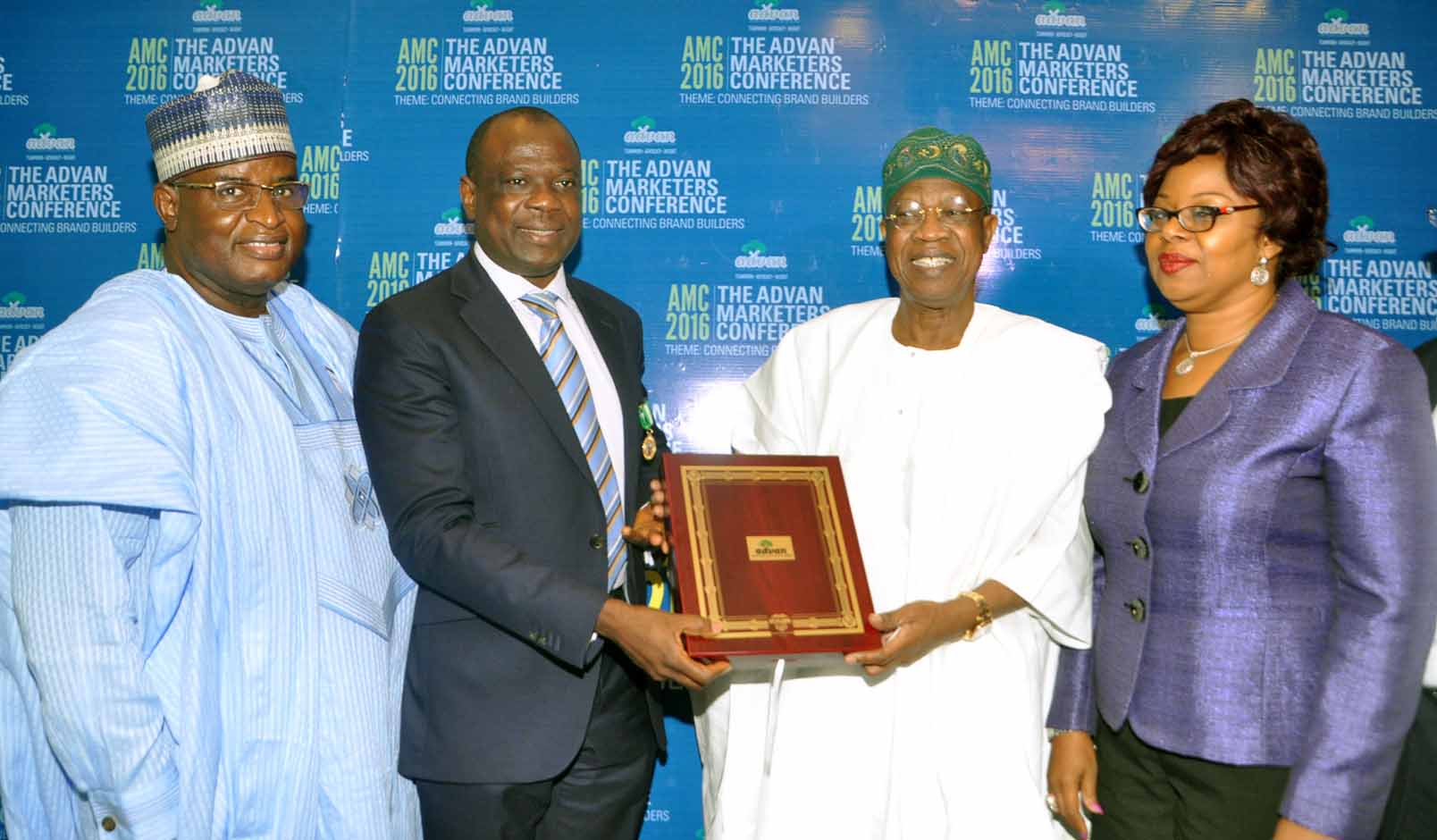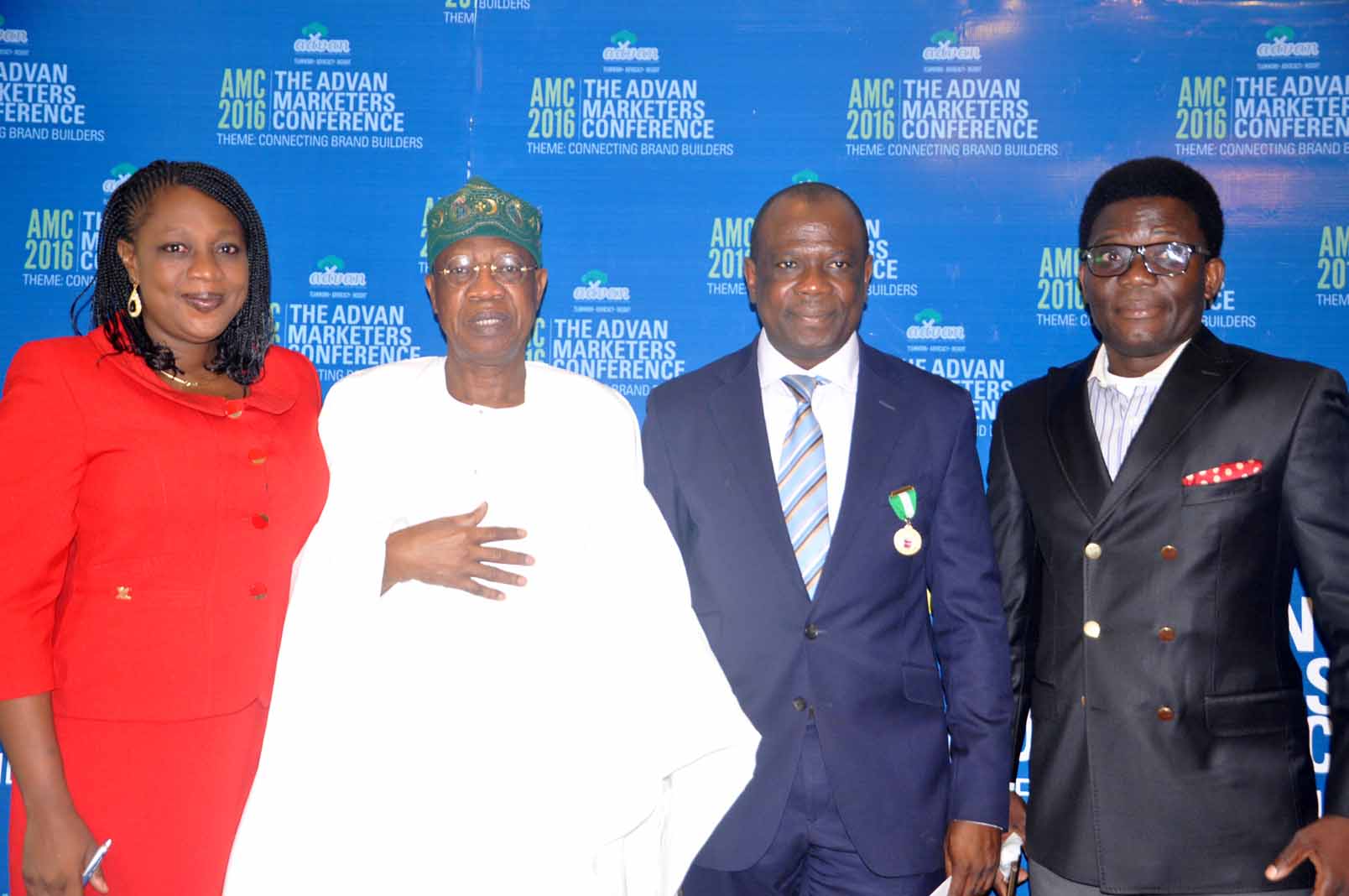
Brands in Nigeria have been advised to innovatively expand and sustain their platforms for consumer engagement even during periods of difficult economic climate like the one experienced in Nigeria at present. The advice was handed down last Friday by Nigeria’s frontline brand research and consumerism expert, Lampe Omoyele at the maiden edition of Advertisers’ Association of Nigeria (ADVAN) Marketers Conference.
Lampe who is also the Managing Director of The Nielsen West Africa, a brands and marketing research company, strongly urged brands not to succumb to the temptation of cutting down on their marketing budgets despite internal and external pressures because they will ultimately make more gains.
Presenting a paper on ‘Consumer Confidence Trends and Engagement’, Lampe noted that since the third quarter of 2015, consumer confidence in the economy has dropped significantly, and it has dropped even further in the first quarter of 2016 due to nagging issues like devaluation, foreign exchange crisis, high inflation, budget delay and many others. He also noted that his company’s research revealed that there was a general decline in job prospects and a reduced willingness to spend by most consumers.
Because of these challenges, he explains further, most households now prioritise their expenditures and are consistently cutting down on what they spend on.
Lampe also noted that, as expected, the sector that has had the worst hit is the FMCG, which is usually a major indicator for consumer confidence in any country. Most of the companies in the FMCG, he stressed, have reported losses. On the other hand, Alcoholic beverage brands, Telco brands and non-alcoholic beverage brands have all recorded some growth despite the drop in consumer confidence.
According to Omoyele, the growth in the alcoholic sector resulted from the natural tendency for alcoholic consumption during “down or low moments”. Telco companies, from his research, recorded growth because of the general attitude of Nigerian to talk and connect with family and friends regardless of the economic situation.

However, from his study, the growth in the soft drink segment was primarily driven by Coca-Cola’s share a Coke campaign which was a highly successful and inspiring marketing drive. Likewise, growth in the alcoholic segment has been largely driven by Nigerian Breweries. Diageo Nigeria was in a form of decline despite the acclaimed success of Orijin, the rave of the moment alcoholic brand.
Lampe explained further that the key factor responsible for the growth of NB Plc was their acquisition of Consolidated Breweries which had a host of value brands. “So the growth was driven by the value brands,” he said.
This study’s INDEX- an acronym for Information through Disguised Experimentation- was gathered each quarter via survey of households and consumers opinion on current conditions and future expectations of the economy. And the current reverses in the economy according to the research and marketing expert have been triggered by inflation and other macro-economic issues like fall in oil prices, delay in the passage of budget, static wages, loss of jobs etc.
Ultimately, Lampe warned that the FMCGs must begin to engage consumers in a positive way if they want to retain or even expand market share. “They must ensure they remain in touch with people consuming their brands, and they should do so through quality engagement” he admonished.
Also presenting a second lead paper on ‘key digital trends and opportunities for Advertisers’, Juliet Chiazor, Country Manager of Google Nigeria stressed that It is time Brands start considering using digital platforms and tools for marketing if they don’t want to go into extinction. Reinforcing this belief, she stated that whether brand owners like it or not, digital communication has come to stay so brands must learn how to utilize it properly. As part of her organisation’s contribution to this vital need for awareness, she announced that Google would be offering free digital training to five people from each member organisation of ADVAN.
All through her lecture, Juliet spiced the presentation with different digital ads to project the level of growth and development of digital advertising in the last few years. She also pointed out the advantages of producing an ad basically for an online audience as against just transferring TV ad to the online medium.
There were two panels of discussants anchored by Chidi Okoro, MD of UAC Foods Plc; and Ugo Geri-Roberts, MD of Milward Brown Nigeria, to dissect various issues thrown up by the two main speakers. The panellist included, Joan Ihekwaba, GM- Marketing, UAC Foods Nigeria; Kachi Onubogu, Commercial Director, Promasidor Ltd; Ken Onyeali Ikpe, MD/CEO of Mediacom Nigeria; Fatai Odesile, Managing Director of Grand Oak Ltd, Bunmi Oke of 141 Communications; Obinna Anyalebechi, Consumer Marketing, Guinness Nigeria Plc and others

In their submission, they advised that Marketers should be mindful of what consumers want and work towards achieving them.. On the relevance of the digital space in Marketing they stressed the importance of flexibility, creativity and openness but they also advised that brands should not just focus on what is “shinning and new” but what can really deliver in the marketplace.
So many top marketing players and, experts were guests at the conference that had the Minister of Information and Culture, Alhaji Lai Mohammed, as special guest of honour.
In his keynote address at the conference, Alhaji Mohammed stressed the need for ADVAN and government to work as a team so that government can learn from the professional marketers on how best to build consumer/citizens’ confidence in a difficult situation and galvanise them to rally behind government and support its policies.
The Information and Culture Minister also used the platform to speak on the recent increase in the pump price of petrol to N145 per litre, and highlighted that it would create additional 600,000 jobs.
He also listed other benefits to include ending to the recurrent petrol scarcity and ensuring steady availability across the country.
According to him, the action would reduce smuggling, diversion of petroleum products, improve domestic supply, cause labour market stability and add jobs to the job profile of the country through new investments in refineries and the retail chain.
He insisted that the decision was in the best interest of the masses adding that only complete deregulation would make for availability of products. He also sought the understanding and cooperation of the citizens and the various organisations in the efforts to end the cycle of fuel scarcity.
Earlier in his welcome address, the President of ADVAN, Mr David Okeme, said the association, an umbrella body of brand owners and advertisers, was formed 22 years ago. He revealed that the conference was in line with the association’s tradition of keeping strategic marketing issues on the front burner of businesses in Nigeria,
Okeme promised that more programmes are in the offing this year for the purpose of aggregating all shades of thoughts, ideas and suggestions that will place the relevance of marketing at the heart of strategic business discussions in Nigeria.













